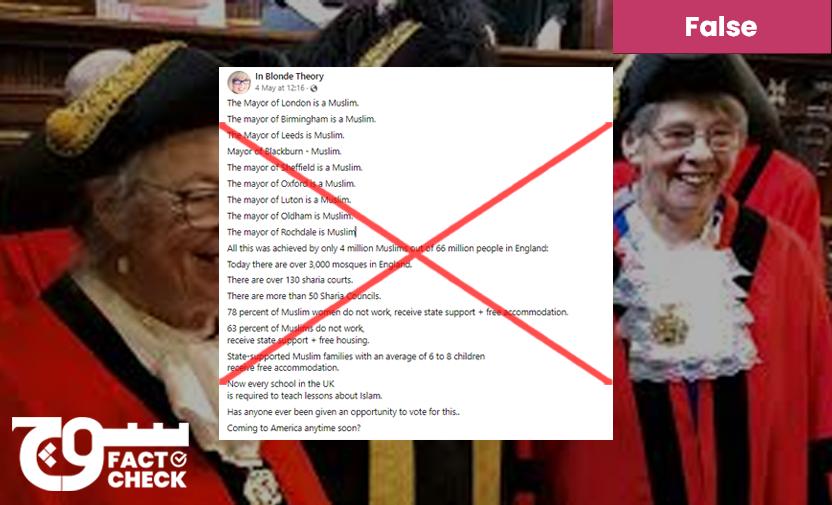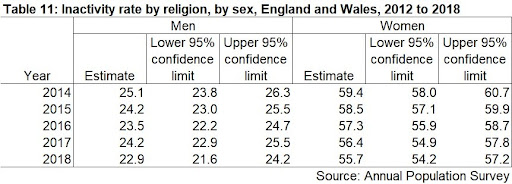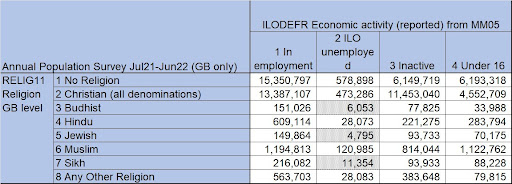
Claim: A social media post makes several claims about Muslims in the UK, including but not limited to identifying mayors of several cities as Muslim, stating that most Muslims do not work and instead claim state benefits, and alleging there are over 3,000 mosques in the UK.
Fact: All the claims made in the post are false or misleading; some of the mayors said to be Muslim are not; a majority of Muslims do work, and there are between 1,000 to 2,000 mosques in the UK. The list of claims made in the social media post is inaccurate and has been thoroughly debunked in this article.
In early May, several social media posts began circulating, listing several claims about Muslims in the UK and their alleged political, social and economic characteristics.The list can be viewed below:
Upon closer examination, these claims are inaccurate. In this fact-check, Soch Fact Check delves into each claim to separate fact from fiction.
Fact or Fiction?
From the demographics of city mayors, the number of mosques and the role of Sharia councils, to the employment status and family demographics of Muslims in the UK, each claim reveals complexities that require careful examination. Let’s delve into the detailed fact or fiction sections to unravel the truth.
Claim 1: The mayors of London, Birmingham, Leeds, Blackburn, Sheffield, Oxford, Luton, Oldham, and Rochdale are Muslim.
Fact 1: While London, Oxford, Luton, and Oldham indeed have Muslim mayors, this assertion is false for the other mentioned cities. Notably, Birmingham, Leeds, Blackburn, Sheffield, and Rochdale do not currently have Muslim mayors.
While London’s mayor Sadiq Khan, Oxford’s Lubna Arshad, Luton’s Mohammed Yaqub Hanif, and Oldham’s Zahid Chauhan are Muslims, Birmingham’s mayor Chaman Lal is a Sikh, Leeds’ mayor Al Garthwaite is a Christian, and Blackburn’s Brian Taylor, Sheffield’s Colin Ross, and Rochdale’s Mike Holly are individuals of white British descent, with their faith not publicly specified.
It’s important to note that Muslims, constituting around 6% of the UK’s population, have served in various council and mayoral roles over the years, but they do not hold the mayorship in all the cities listed.
The religious affiliations of mayors are not publicly documented, so it is unclear how the author of this post could assert that all those listed are Muslims.
Claim 2: There are over 3,000 mosques in the UK.
Fact 2: Estimating the exact number of mosques in the UK proves challenging due to varying definitions and registration practices. While figures may differ, the most reliable estimates suggest a number between 1,000 and 2,000 mosques.
Counting mosques in the UK poses a challenge similar to tallying churches, synagogues, and other places of worship due to varying definitions and registration practices. While figures may differ, the most reliable estimates suggest a number between 1,000 and 2,000 mosques.
The Home Office holds a list of premises registered for marriages, yet this isn’t comprehensive. Mosques aren’t required to register under the Marriage Act, and recording practices vary, complicating identification. Full Fact’s analysis found around 1,300 records indicating mosque registrations out of nearly 30,000.
In 2018, the UK government responded to a query in the House of Lords by stating that they believed there were around 1500 mosques and prayer spaces in England.
In 2020, the Muslim Council of Britain conveyed to the Lords Public Services Committee that there are approximately 1,200 mosques across Britain in written testimony regarding insights gained from the coronavirus pandemic.
MuslimsInBritain.org lists 2,143 locations where Muslims can offer their daily prayers in 2024, cautioning that only about 1,850 are single-purpose mosques, with others being proposed, multi-faith worship areas, or uncertain.
Claim 3: There are over 130 Sharia Courts and 50 Sharia councils in the UK.
Fact 3: The distinction between Sharia courts and councils is negligible, and accurate figures regarding their quantity remain unclear. While major Sharia councils have been identified, the exact number is uncertain. Importantly, these bodies do not possess legal authority to supersede UK laws.
Sharia courts and councils serve to interpret Muslim religious law, with no clear distinction between the two. They lack the authority to override national law and operate outside formal legal structures. Research indicates varying numbers and types of these organisations, with estimates ranging from 30 major councils identified by the University of Reading to figures of “85 at least” reported by Civitas in 2009. However, these estimates include online forums and acknowledge the lack of definitive figures.
A UK Home Office review from 2018 found that there were around 30 to 85 of these councils in England and Wales, with none being present in Scotland.
While numerous councils and tribunals operate on Sharia principles, they primarily address religious matters and do not hold legal authority. Many issue Islamic divorce certificates and offer guidance on religious law matters, often affiliated with mosques. Additionally, some provide family mediation services and arbitration based on religious principles, but their decisions are binding only if both parties agree and cannot contravene national law, according to the 2018 Home Office review.
They primarily deal with religious matters, such as family disputes and divorces, and do not have legal authority beyond the agreements made voluntarily by the parties involved. The Home Office review expressed some concern about discrimination and women’s rights in these proceedings, however, it asserted they must abide by UK laws, which already formally disallow gender-based discrimination.
Claim 4 and 5: 78% of Muslim women don’t work and are on free benefits or housing; and 63% of Muslim men don’t work and are on free benefits or housing.
Fact: A maximum of 44% of Muslims were “out of work” (either unemployed or economically inactive) in 2021. It’s impossible for the rate for both men and women to surpass this figure—particularly if the count only included individuals receiving benefits or residing in social housing. According to a 2021 Census, 27% of Muslim households in England and Wales live in social housing, therefore, the claim is false.
According to Annual Population Survey data released by the UK Office for National Statistics in 2020, unemployment for Muslim men and women had fallen to 5.7% in 2018 compared to 9.8% in 2012.

Economic inactivity in 2018 also fell to 22.9% for men and 55.7% for women, compared to 25.1% for men and 59.4% for women in 2014.

Recent data on unemployment among Muslims is not readily accessible online, but there has been a decrease in unemployment rates from 2012 to 2018. However, approximately 6% of Muslims were unemployed, and 38% were economically inactive, meaning they were not employed, had not been seeking employment in the past four weeks, and were unable to work in the next two weeks. This category includes individuals who are studying, retired, or caring for families or homes.

In total, this indicates that nearly 44% of Muslims could be considered as “not working.” Therefore, it’s unlikely that the unemployment rates for both men and women would be higher, especially when considering only those who also receive benefits or live in social housing. Data published based on a freedom of information request in 2022 shows unemployment and economic inactivity rates were relatively stable between 2018 and 2021-2022, around 6% and 38% respectively between June 2021 and June 2022.

Furthermore, factors contributing to the employment disparity between Muslims and non-Muslims, highlighted by the Women and Equalities Committee’s inquiry on employment opportunities for Muslims in the UK, are diverse and intricate. These include issues such as discrimination, Islamophobia, stereotyping, familial pressures, inadequate guidance regarding higher education choices, and a lack of sufficient role models across education and employment sectors.
Regarding welfare or benefits claimants by religion, there’s a lack of available data. However, it’s important to note that, according to a 2021 census, only 27% of Muslim households in England and Wales reside in social housing, dispelling the misconception that a majority of Muslims live in such accommodation.
Claim 6: Muslim families have an average of six to eight children.
Fact 6: The last time this data was published was in a 2011 census, which states that the average Muslim household in England and Wales has 2.3 children, slightly higher than the overall average of 1.8 children per household.
Contrary to the claim of Muslim families having six to eight children on average, data from the 2011 census indirectly indicates that Muslim households in England and Wales typically have 2.3 dependent children, slightly higher than the national average of 1.8 dependent children per household.
Similar data about the number of dependent children by religion of the household has not been published for the 2021 census, and the UK Office for National Statistics does not directly collect or publish data on birth rates by religion.
Claim 7: Every school in the UK is required to teach lessons about Islam.
Fact 7: While religious education is compulsory in UK schools, not every institution is mandated to provide standalone lessons on Islam, and students are taught religion “non confessionally” meaning they are informed about Islam as a subject of study rather than being taught its religious beliefs and practices directly.
In England, while religious education (RE) is mandatory in schools, it’s not part of the national curriculum but rather falls under the “basic curriculum,” allowing for local input. This means that every school isn’t obliged to teach lessons about Islam, except for independent and voluntary schools with a religious foundation.
Furthermore, although religious education is compulsory in UK schools, in the non-confessional religious education framework of UK schools, students are not instructed in the religious beliefs and practices of any religion itself, but rather are provided with information and knowledge about the religion as a subject of study, emphasising its historical, cultural, and social aspects within an educational context. In the mandatory non-confessional RE, Islam is included among the religions discussed. This approach, although not focusing on confessional Islamic Religious Education (IRE), provides students with knowledge about Islam as part of a broader educational framework.
Additionally, publicly funded Muslim schools exist, but they are not widespread, and they must adhere to the national curriculum. So, while there are various educational options available, not every school in the UK is required to teach standalone lessons about Islam, but it is integrated into the broader educational framework.
Virality
Some of these claims have been shared numerous times in the past. In December 2023, many of the claims in the post were shared as a poster on Facebook, Instagram, and TikTok, where it received thousands likes and shares. The claim was also fact-checked earlier in December 2022 by Full Fact here, they also fact-checked the same in 2017 here.
In May 2024, a similar list of claims resurfaced, reigniting speculation about UK Muslims burdening the economy and Islamising the government.
On Facebook, we found that it was shared here, here, here, here, here, here, here, here, here, here, here, here, here, here, here, here, here, and here.
Conclusion: A viral claim regarding Mayors of various cities in England being Muslim is inaccurate and has been recycled from 2022 and 2023.
—
Background image in cover photo: Exeter City Council News
To appeal against our fact-check, please send an email to appeals@sochfactcheck.com
